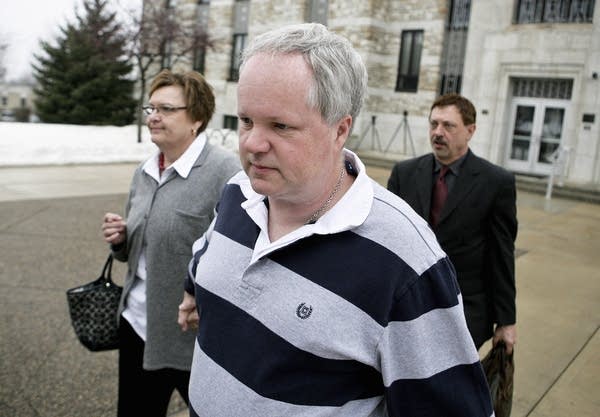Guilty verdict in suicide case; appeal likely
Go Deeper.
Create an account or log in to save stories.
Like this?
Thanks for liking this story! We have added it to a list of your favorite stories.

The attorney for a former nurse found guilty of assisting two suicides through online communication said he and his client will likely appeal.
A Rice County judge on Tuesday issued a written guilty verdict against William Melchert-Dinkel, of Faribault, who was charged with two counts of assisting suicide in the deaths of a woman from Canada and man from England.
Melchert-Dinkel's attorney, Terry Watkins, said he was still reviewing Judge Thomas Neuville's order, but he said an appeal will likely come sometime after Melchert-Dinkel is sentenced on May 4.
"At this point in time I don't think there's any question that our focus will be on an appeal," Watkins said.
Turn Up Your Support
MPR News helps you turn down the noise and build shared understanding. Turn up your support for this public resource and keep trusted journalism accessible to all.
Neuville ruled that Melchert-Dinkel intentionally encouraged and advised Nadia Kajouji and Mark Drysbrough to commit suicide in 2008 and 2005, respectively.
Melchert-Dinkel had waived his right to a jury trial and agreed upon the facts of the case, so the judge's findings were not surprising to outside observers.
But Watkins said while he agreed on the definition of the crime -- prosecutors had to prove that Melchert-Dinkel "imminently incited" the suicides -- he disagreed with the judge's conclusion.
"We agree with that standard, we just don't agree that Mr. Melchert-Dinkel's actions in this situation meet that standard," Watkins said. During the bench trial late last month, Watkins argued that Kajouji and Drysbrough had already decided to kill themselves before talking to Melchert-Dinkel.
In his order, Neuville disagreed. "These arguments are irrelevant because predisposition of the person who commits suicide is not a defense" to the statute, Neuville wrote. "The predisposition of a suicide victim actually makes the victim more vulnerable to encouragement or advice, and their death more imminent and foreseeable."
Neuville said Melchert-Dinkel "never tried to discourage" the victims from committing suicide. "Rather, the facts indicate repeated and relentless encouragement by Defendant to complete the suicide," he wrote.
Prior to the trial, Watkins had tried to get the case dismissed, saying his client was exercising his free speech rights and couldn't be charged under Minnesota's assisted suicide statute because the alleged victims were in other countries. He also said Minnesota's law was void for vagueness.
Neuville rejected the arguments, allowing the charges to stand.
Watkins said an appeal would most likely focus on the question of whether Melchert-Dinkel's actions were protected under the First Amendment. He said he and his client could also choose to appeal other pre-trial decisions and the conviction itself.
"I think we've been pretty clear throughout ... we would have very much appreciated this ending at the district court level, but if it did not that we would continue to go down the judicial avenues available until we have either had this matter set aside in a way that we believe is correct or exhausted all avenues available to us," he said.
Dear reader,
Political debates with family or friends can get heated. But what if there was a way to handle them better?
You can learn how to have civil political conversations with our new e-book!
Download our free e-book, Talking Sense: Have Hard Political Conversations, Better, and learn how to talk without the tension.





